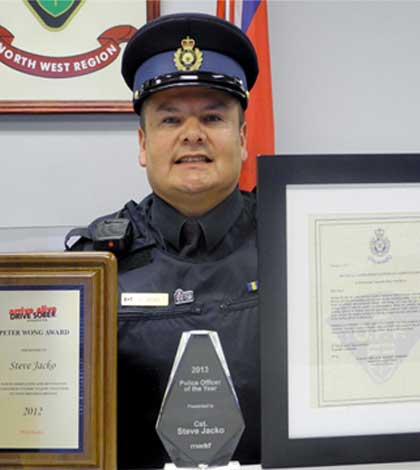EVANSVILLE—A Burpee-Mills Township councillor says the new Ontario Provincial Police (OPP) billing model is not fair to rural municipalities.
“Is this new billing model equitable and fair for all municipalities? Not for rural municipalities,” stated Wayne Bailey. Representatives of the municipal policing bureaus of the OPP are introducing their new billing model at engagement sessions for council representatives of Ontario municipalities.
Mr. Bailey explained that at the Sault Ste. Marie session for Manitoulin and North Shore municipalities on November 19, council representatives were given the following rationale for changing the mode of billing. “Concerns have been raised by some municipalities about the variance in per household policing costs among municipalities under the OPP’s current billing model.” As a result, the OPP was requested by the provincial auditor general to address the issue of municipalities paying different rates for OPP services.
Since the present billing model was based partially on “ability to pay” (consideration of the municipality’s assessment) and the “calls for assistance” from the municipality, large urban centres with more demand for policing services were finding their ‘calls for service’ very expensive, said Mr. Bailey. These municipalities contend that a larger portion of the total policing costs should be designated as a base amount supported equally by all households in Ontario. Although this would be more costly to rural municipalities, the premise is justified by considering policing as an available service for the use of all communities on an as needed basis, despite the low frequency of rural community calls for service.
Mr. Bailey said those at the meeting were told the new billing model, devised to appease urban communities, divides policing services into two sections: the first a base amount (83 percent of policing costs). The municipality will be charged approximately $260 per household to assure that policing services will be available when needed. The second, a call for service amount (27 percent of policing costs), sees each incident involving a call for service in a municipality resulting in an addition to the base amount charged to the municipality.
“In 2015, the average per household under the new model is estimated to be $369 for base service level plus calls for service,” said Mr. Bailey.
The new model is not fair for rural municipalities, he said. “Firstly, the commercial assessments in the large urban municipalities support their municipal reserves with tax revenue. With this extra funding, these municipalities are more capable of financing their policing services compared to rural municipalities. For this reason, many municipal representatives at the information session were astounded to learn that commercial sites are not considered in the new billing model. One would think that commercial sites would require extensive policing services.”
Mr. Bailey continued, “secondly, base amount charges are calculated on the number of MPAC (Municipal Property Assessment Corporation) determined households, not Ontario Census determined households. For example, Burpee Mills, a rural municipality, has 330 MPAC households, which will cost the municipality $85,800 base amount for policing. If the Ontario Census households number of 145 was used, the base amount for policing would be $37,700. This rural municipality will be charged for policing services for the additional 185 hunt camps and small cottages on an equal rate as million dollar homes in southern Ontario. It’s ludicrous to designate a hunt camp as a household. Seasonal dwellings may require some policing activity, but not to the extent of residential households.”
“Thirdly, under this new billing model, a municipality’s calls for service will be designated as approximately 27 percent of its policing costs,” continued Mr. Bailey. “Since Burpee Mills, historically, has been charged for very few calls for service, its policing costs have been relatively low, a five-year average of $53,150.80. Now with this new billing model the 2015 projection is $121,770, amounting to a 229 percent increase in costs. Burpee Mills is only one example. Other municipalities will be burdened with similarly increasing costs for policing services commencing in 2015.”
“Finally, a portion of the provincial RIDE (Reduce Impaired Driving Everywhere) program will be downloaded as a municipal funding responsibility,” said Mr. Bailey. “The municipal policing representatives (at the meeting) refused to elaborate on this provincial download. It was stated that they had no information regarding the portion of the RIDE program that the province would continue to fund. How many of these provincial downloads can municipalities endure and still survive as viable communities?”
Mr. Bailey told the Recorder, “faced with the financial pressures that this new billing model would inflict on their communities, there were some municipal representatives at the Sault Ste. Marie OPP billing model engagement session that were considering possibilities for agreements with other policing service providers. Unfortunately, at the time, they were unable to determine any viable options. Civilian policing would be supervised by the OPP and would be considered an add-on to the OPP costs; an add-on that must be financed 100 percent by the municipality. Municipalities were also informed that it is illegal for them to sign contracts with Anishinaabe Police forces.”
“It is my opinion that rural municipalities are not going to be happy with the increased costs of services resulting from this new policing model based on MPAC household numbers,” said Mr. Bailey. “Although the planning of this new billing model is in its final stage of development, there may still be time to react if this proposal will have negative effects on a community’s policing costs.”
Mr. Bailey added, “since I was the only council representative from Manitoulin who attended this session, I have no information as to how this billing model will affect the other Manitoulin municipalities. From the information I received at the meeting, I would venture to guess that most of them are going to experience a hike in their policing costs.”
“It will probably not affect Gore Bay as much as others for instance, because the town has so much residential housing. But for others like Central Manitoulin, where there are a lot of rural areas and cottages, it will,” said Mr. Bailey.





